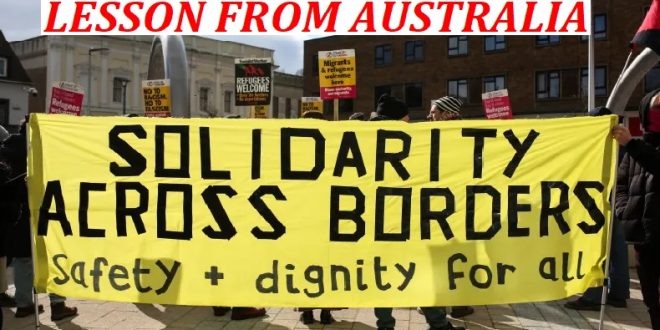01-04-2023
LONDON/ CANBERRA: Plans by the United Kingdom to detain and deport asylum seekers who arrive on its shores by unauthorized means, such as in small boats, is a replica of Australia’s notorious Operation Sovereign Borders, activists, lawyers and refugees in Australia say.
 The UK’s proposed Illegal Migration Bill, they say, will be ineffective against people smugglers, like the Australian policy, and will also destroy the lives of people seeking asylum through indefinite detentions and a disregard for human rights.
The UK’s proposed Illegal Migration Bill, they say, will be ineffective against people smugglers, like the Australian policy, and will also destroy the lives of people seeking asylum through indefinite detentions and a disregard for human rights.
Immigration detention in Australia is akin to “torture”, Ian Rintoul, a political activist and spokesperson for the Refugee Action Coalition in Sydney, Australia, told media.
“Detention centres (in Australia) are commonly understood now famously understood to be the factories of mental illness,” Rintoul said, referring to depression and other illnesses many asylum seekers and refugees in Australian immigration detention have developed.
Though the UK says its bill is designed to stop people smuggling and push asylum seekers into safe and legal routes to enter the UK, immigration detention will be the first port of call for processing asylum seekers who arrive by irregular means in the UK.
Plans are now under way to convert former Royal Air Force bases in Essex and Lincolnshire into detention centres to accommodate those who will be detained under the UK bill, which does not specify a time limit on how long asylum seekers can be held.
 Clause 12 of the proposed bill states that an asylum seeker may be detained for as long as is “reasonably necessary” to decide what should be done about their asylum claim.
Clause 12 of the proposed bill states that an asylum seeker may be detained for as long as is “reasonably necessary” to decide what should be done about their asylum claim.
This leaves the way open for indefinite, arbitrary detention, similar to what often happens in Australia, said Alison Battisson, an Australian human-rights lawyer and director of the Human Rights for All organization.
“There will be a [movable] feast… which is: your detention will come to an end if and when we remove you or we make some other administrative decision that allows you to stay,” Battisson said.
This limbo is the main anguish of indefinite immigration detention, said Battisson, who works with refugees across Australia’s immigration detention system.
Immigration detention centres in Australia are also extremely violent and drug problems are prevalent, she added.
“In some cases, (some) detention centres are run by certain criminal gangs. So it’s an incredibly frightening place to be,” she told media.
“You have no any idea about your future”, said Hossein Latifi, a refugee who spent nine years in Australian immigration detention and was only released early last year.
 “Those people, they never committed any crime. They came for safety and freedom and a better future,” he said.
“Those people, they never committed any crime. They came for safety and freedom and a better future,” he said.
Throughout his years in Australian detention, Latifi had no indication of when it would end.
Unlike an inmate in prison, he did not have a sentence with a set release date. The not knowing was incredibly damaging to his mental and physical health, he said.
“You become (a) very depressed person.”
“You don’t want to talk to your family. You don’t want to talk to anybody,” he said. “Just one question in your mind… when I’m going to be out of this place.”
Now released on a bridging visa, Latifi said he will never forget what happened to him.
“You won’t feel the same again that you felt before detention,” he said. “You don’t forget it.” (Int’l News Desk)
 Pressmediaofindia
Pressmediaofindia




